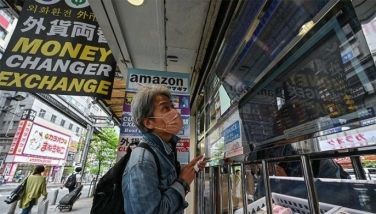ADB airs ‘cautious optimism’ over RP’s prospects under GMA
January 26, 2001 | 12:00am
The Asian Development Bank (ADB) has expressed "cautious optimism" over the short term prospects of the Philippine economy under the Arroyo administration.
Dr. Gunter Hecker, ADB country director for the Philippines, said there are a number of things that the new administration must accomplish to win back investor confidence.
For one, he said the new administration must contain its ballooning budget deficit and improve its revenue collection. "The big guys should be made to pay their taxes and not just the small people," Hecker said.
Official development assistance (ODA) funding agencies like the ADB are extremely concerned with the deficit as it may affect the government’s ability to replay its loans. Several government agencies have in fact been seeking extensions for their loans which are sovereign-guaranteed.
The government’s inability to stop its bleeding would result in less financing for socially-related activities and a reduced allocation for basic services.
The ADB predicts weaker exports for the country while expressing concern over the performance of the agriculture sector which is expected to be hit by the El Niño phenomenon this year.
The regional financial institution advised the Arroyo administration to review its export priorities as it has been almost totally dependent on the elctronics sector. The said sector is the only bright spot of Philippine exports accounting for 63 percent of earnings, or 30 percent of the country’s gross national product (GNP).
The electronics sector is considered "too exposed" but it remains mostly in the simple assembly level. The ADB said the sector should diversify its production line and "bring it to a higher level of production."
Hecker, meanwhile, said the new administration must address the Mindanao peace and order problem if it is to encourage more investments from both the domestic and foreign businesses.
"The peace effort must be rekindled," he said, adding that the country can not expect more development assistance from the international financial institutions, much less expansion of existing loans or grants, unless the peace situation is resolved.
Dr. Gunter Hecker, ADB country director for the Philippines, said there are a number of things that the new administration must accomplish to win back investor confidence.
For one, he said the new administration must contain its ballooning budget deficit and improve its revenue collection. "The big guys should be made to pay their taxes and not just the small people," Hecker said.
Official development assistance (ODA) funding agencies like the ADB are extremely concerned with the deficit as it may affect the government’s ability to replay its loans. Several government agencies have in fact been seeking extensions for their loans which are sovereign-guaranteed.
The government’s inability to stop its bleeding would result in less financing for socially-related activities and a reduced allocation for basic services.
The ADB predicts weaker exports for the country while expressing concern over the performance of the agriculture sector which is expected to be hit by the El Niño phenomenon this year.
The regional financial institution advised the Arroyo administration to review its export priorities as it has been almost totally dependent on the elctronics sector. The said sector is the only bright spot of Philippine exports accounting for 63 percent of earnings, or 30 percent of the country’s gross national product (GNP).
The electronics sector is considered "too exposed" but it remains mostly in the simple assembly level. The ADB said the sector should diversify its production line and "bring it to a higher level of production."
Hecker, meanwhile, said the new administration must address the Mindanao peace and order problem if it is to encourage more investments from both the domestic and foreign businesses.
"The peace effort must be rekindled," he said, adding that the country can not expect more development assistance from the international financial institutions, much less expansion of existing loans or grants, unless the peace situation is resolved.
BrandSpace Articles
<
>
- Latest
- Trending
Trending
Latest
Trending
Latest
Recommended


























